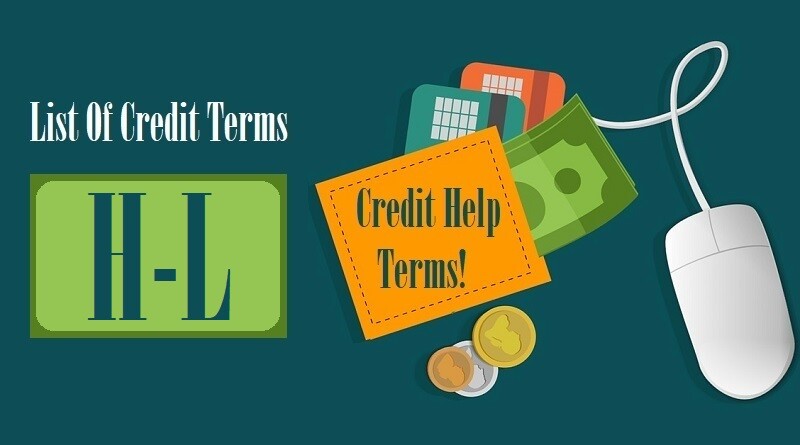
List Of Credit Terms H I J K L

Confused By The Credit Terms?
Our glossary of credit terms will help you learn the most common financial terms, words and phrases, as well as the meaning for dozens of legal and credit terminology terms alphabetically.
A |
B |
C |
D |
E |
F |
G |
H |
I |
J |
K |
L |
M |
N |
O |
P |
Q |
R |
S |
T |
U |
V |
W |
X |
Y |
Z
H
Hearing Impaired Consumer Service – A special phone number available for hearing impaired consumers who have a TDD. The number for Experian is 1-800-972-0322.
High Risk – High risk consumers have delinquencies, bankruptcies, charge-offs or public record items on their credit report. These are indications to lenders that a consumer has been an irresponsible use of credit, and will likely be so in the future. High-risk consumers may only be able to get credit with very high interest rates, if at all.
Home Appreciated At – Annual appreciation you estimate in the home you are purchasing. Not all homes appreciate at all times and can lose value (depreciate) as well.
Home Equity Closing Costs – Any costs other than interest added to the home equity loan. Costs can include any appraiser fees, points paid, or other misc. fees. Costs can be paid up front or added to the loan balance.
Home Equity Interest Rate (APR) – Annual percentage rate for the home equity loan.
Home Equity Line of Credit (HELOC) – A mortgage loan that allows the borrower to obtain multiple advances of the loan proceeds at his or her discretion, up to an amount that represents a specified percentage of the borrower’s equity in property.
Home Equity Loan – Loan based on the difference of the amount you own on your home, and the home’s current market value.
I
Identity Theft – A form of fraud in which a consumer’s financial information is illegally acquired for the purpose of making unauthorized purchases and transactions with their credit cards, or with funds from their checking or savings accounts.
Income Tax Rate – This is your federal, state and local income tax rates combined. Your income tax rate is important in determining the amount you can save if you use a home equity loan to consolidate your debt.
Index – A number indicating a change in quantity, as of prices, relative to the magnitude at some specified point usually taken as 100.
Inquiry – There are two types of inquiry. A hard inquiry is when you have applied for credit, which gives the lender permission to pull your credit report. All hard inquiries are available for all credit grantors to review. A soft inquiry is only available for you to see. It does not influence your credit score. This type of inquiry includes your request for your credit report or pre-screen inquiries for credit grantors.
Installment Debt – Credit accounts in which the debt is divided into amounts to be paid successively at specified intervals until the debt is paid off.
Installment Loans – A Debt or a credit account to be paid at regular interval of time over a specified period, number of payments are predetermined or fixed.
Interest Rates – The percent, per unit of time, of the total sum borrowed that is charged by a bank or financial institution for the use of their money.
Investigative Consumer Reports – These are consumer reports that are usually ordered by a prospective employer for sensitive jobs where background checks and security clearances are necessary. An investigative consumer report might contain information obtained from a credit report, but it is more comprehensive than a credit report. It contains subjective material on an individual’s character, habits and mode of living, obtained through interviewing the associates and neighbors of the person being investigated. Experian does not provide investigative consumer reports.
Interest – The cost of borrowing or lending money, usually a percentage of the amount borrowed.
Interest Free Period – The interest-free period is a grace period that is determined by a credit grantors or issuers in their normal way of business and the nature of the product. Credit cards are always carry this benefit of interest-free period and on the other hand there is no interest-free period for cash advances or balance transfers, and interest is charged from the day you withdraw the funds.
In relation to credit cards, the interest-free period on new purchases starts on the date you make a purchase and ends when the credit card issuer begins charging you interest on that purchase. The interest-free period includes the grace period determined by the credit card issuer. It may not apply unless certain conditions are met.
- This method is used by some of the credit card issuers to determine whether the interest-free period applies to your new purchases. With this method, it applies only if you pay your current month’s balance in full by the due date.
- This method is used by some of the credit card issuers to determine whether the interest-free period applies to your new purchases. With this method, it applies only if you pay your current month’s balance in full by the due date, and you have also paid your previous month’s balance in full by the due date (in other words, you’re not carrying a balance from the previous month).
Investment Rate of Return – The amount you expect to earn on your investments. This is the return that you would make if you were to invest your down payment, security deposit or closing costs instead of using it in your purchase or lease of an auto or purchase of a home.
Involuntary Bankruptcy – A petition filed by certain credit grantors (instead of by the individual or business) to have a debtor judged bankrupt. If the bankruptcy is granted, it is known as an involuntary bankruptcy.
Issuer – A company or public sector entity with shares, bonds or other securities listed on a stock exchange.
Item Specific Statement – On your credit report, you have the right to offer an explanation about a particular account or public record item. Only one item-specific statement may be added per item. An item-specific statement is also known as a “consumer statement”.
J
Joint Accounts – Typically a bank account in the names of two (or more) persons. Arrangements can be made such that either individual or all signatures are required when drawing checks.
Judgment – An official court decision of an action or suit. This public record may be listed on your credit report in matters of money and debts owed.
Judgment Granted – A final determination issued by a court for the rights of the parties involved in a lawsuit.
K
KOBA Code – A one or two alpha character code that defines or classifies what industry or type of service a given company offers.
L
Late Payment – A delinquent payment; a failure to deliver a loan or debt payment on or before the time agreed.
Lease – Written document containing the conditions under which the possession and use of real and/or personal property are given by the owner to another for a stated period and for a stated consideration.
Lender – A person or company that offers to lend money to a borrower for a given period of time. The borrower is obliged to repay the loan with installments or single payment together with specified interest.
Lien – Legal document used to create a security interest in another’s property. A lien is often given as a security for the payment of a debt. A lien can also be placed against a consumer for failure to pay the city, county, state, or federal government money that is owed.
Line of Credit – A line of credit works like a credit card, except you don’t charge purchases. Instead, a person with a line of credit would use checks to make purchases which are drawn on a line of credit rather than on an amount on deposit. A line of credit will have a maximum amount, like a credit limit.
Loan Origination Rate – The percentage the lending institution charges to cover some of its processing costs in making a loan in addition to the interest it will earn. Example: 1% for a $100,000 home equals $1,000.
Loan Payment – The payment you make to your creditor on a loan. Also, the amount of your standard monthly payment.
Loan Type – Home, auto, personal, and home equity are all loan types. The two most common loans types, home equity and personal, differ in fees, rates, and tax deductibility of interest. Home equity loans often have higher fees, but usually have lower rates and a tax deduction for interest paid. Personal loans do not have a tax deduction for interest paid, and have a higher interest rate, but often have lower upfront fees. These are important considerations when choosing a loan.
Low Risk – Low risk consumers have paid their bills on time, held their credit accounts for several years, and do not have large outstanding balances. In general, they have proven to lenders that they are responsible, prudent users of credit. Low-risk consumers are able to quickly obtain credit at the most favorable interest rates.
